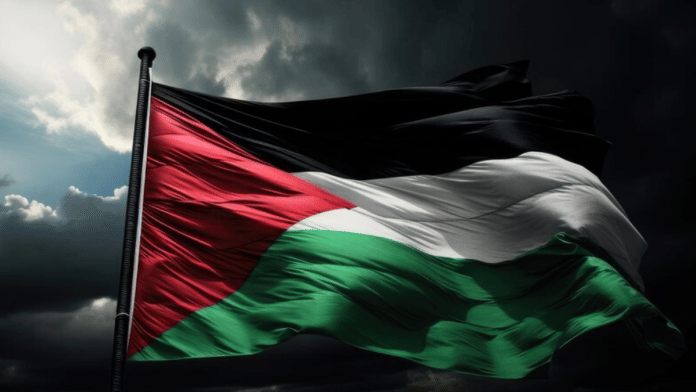New Delhi: About 14 Palestinian factions including Hamas and Fatah signed a China-brokered deal Tuesday to unitedly govern Gaza after the current war ends.
The “Beijing Declaration on Ending Division and Strengthening Palestinian National Unity” went through after three days of talks in the Chinese capital, underscoring China’s growing role in West Asian diplomacy.
The agreement set up a “temporary national reconciliation government” to rule the Gaza strip after the war, Chinese foreign minister Wang Yi explained in his speech at the closing ceremony on Tuesday.
“The most important outcome was to clarify that the Palestine Liberation Organization is the only legitimate representative of all Palestinian people. The most prominent highlight was to agree to form a temporary national reconciliation government around the post-war governance of Gaza. The strongest appeal was to achieve a truly independent Palestinian state in accordance with relevant UN resolutions,” Wang said.
The two major rivals, Fatah and Hamas, also signed the deal in an attempt to seal the divide that has existed since 2006. Hamas, which rules Gaza, and Fatah, which rules the West Bank, have been caught in a violent struggle to fully represent the Palestinian movement globally.
Israel, meanwhile, has rejected the reconciliation effort, saying the country’s security “will remain solely in Israel’s hands”.
Foreign Minister Israel Katz said on X: “Hamas and Fatah signed an agreement in China for joint control of Gaza after the war. Instead of rejecting terrorism, Mahmoud Abbas embraces the murderers and rapists of Hamas, revealing his true face. In reality, this won’t happen because Hamas’s rule will be crushed, and Abbas will be watching Gaza from afar. Israel’s security will remain solely in Israel’s hands.”
Hamas and Fatah signed an agreement in China for joint control of Gaza after the war. Instead of rejecting terrorism, Mahmoud Abbas embraces the murderers and rapists of Hamas, revealing his true face. In reality, this won’t happen because Hamas's rule will be crushed, and Abbas… pic.twitter.com/JZMqeMqH5J
— ישראל כ”ץ Israel Katz (@Israel_katz) July 23, 2024
Abbas is the president of the State of Palestine and chairman of the PLO.
China’s three-step plan
As a part of its mediation efforts, Beijing proposed a “three-step approach” to solve the “current conflict dilemma” in Palestine.
“The first step is to promote a comprehensive, lasting and sustainable ceasefire in the Gaza Strip as soon as possible and ensure smooth access for humanitarian aid and relief… The second step is to uphold the principle of ‘Palestinians governing Palestine’ and work together to promote post-war governance in Gaza… The third step is to promote Palestine to become a full member of the United Nations and start implementing the ‘two-state solution’,” explained Wang.
Apart from representatives from the 14 factions and China, there were other delegations from Egypt, Algeria, Saudi Arabia, Qatar, Jordan, Syria, Lebanon, Russia and Turkey.
This is the second effort by Beijing to bring together Palestinian factions after a summit in April failed to achieve a final consensus. The two rivals have in the past attempted to reunite, but have not been able to.
In the past few years, China has taken an active role as a mediator in West Asia. In March 2023, Beijing brokered a deal between Saudi Arabia and Iran, which led to the normalisation of relations between the two countries after ties were frozen in 2016. Riyadh and Tehran had found themselves on the opposing sides of the civil wars in Syria and Yemen.
Fatah-Hamas rivalry
Fatah is the most important faction of the PLO, which has been recognised as the sole legitimate representative of the Palestinian people since 1974. Hamas, in comparison, has been designated a terrorist outfit by the US, the UK, the European Union (EU) and Israel.
In 2006, Hamas won a majority in the legislative elections to the Palestinian National Authority — a body formed in 1993 as a result of the Oslo Accords — with 74 seats out of 132 seats. Fatah won only 45 seats.
The President of Palestine, Mahmoud Abbas, is from Fatah, and in 2006 he appointed Ismail Haniyeh, the current leader of Hamas, prime minister. However, the partnership quickly unravelled, with Hamas expelling Fatah officials from the Gaza strip in 2007. Haniyeh was dismissed by Abbas, leading to the fissure that has existed till date.
Fatah retained control of the West Bank, while Hamas remained in control of Gaza.
The current conflict was triggered by Hamas’ attack on Israel last October, which killed about 1150 Israelis, while another 250 were taken as hostages. Israel retaliated with an offensive that has killed over 39,000 Palestinians and turned most of Gaza into rubble.
About 120 hostages, alive or dead, remain with Hamas. Last week, US Secretary of State Antony Blinken announced that Tel Aviv and Hamas were close to finalising a ceasefire.
(Edited by Tikli Basu)
Also read: Pro-Gaza activist with history of anti-Hindu statements — Majid Freeman faces terror charges in UK






